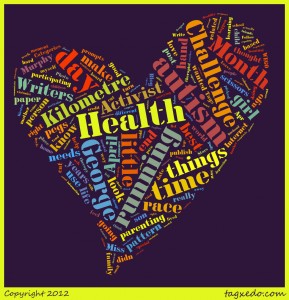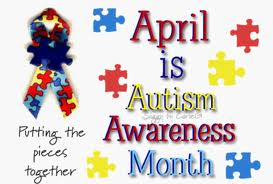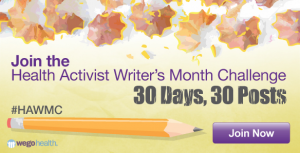This is my favourite picture of myself. Because – well – how could it not be?

What I Hope
I hope that George knows I will always support him in whatever he wants to do, and that I will never see his autism as an obstacle.
I hope that when I am weathering the challenges of autism with George, I am acting in a way that helps him instead of hindering him.
I hope that James knows I understand how tough it must be, being the sibling of a child with autism.
I hope that James knows how immensely I value him as an individual in his own right, and that he is not defined by virtue of being George’s brother.
I hope that George knows he is not defined by autism, but that autism is just one part of who he is.
I hope that the moments of weakness that I have – those times when my desperation and sense of being overwhelmed spill over – do not undermine my kids and cause them lasting damage.
I hope that my better moments – the laughter and the hugs and the words of encouragement – build up their confidence and self-esteem.
I hope that I can always be the kind of autism mom who never gives up a fight, no matter how hard and scary it can be.
I hope that when I talk to strangers about autism, or when I write about it, I am doing so in a way that will help both of my kids as they navigate their way through life.
I hope that I will have the courage to stand up to anyone who ever tries to hurt my kids.
I hope that my kids know that when autism parenting just gets too hard for me to handle and I need to spend time by myself, it’s not because of them. It’s because of my own fears and insecurities that I want to protect them from.
I hope that my kids know I love them without reservation, without boundaries, and beyond the ends of time.
(Photo credit: Kirsten Doyle)

A Myth About Running
An important part of special needs parenting – indeed, of any parenting – is staying healthy. For a long time I didn’t do this. I had some mental health conditions that were going untreated, and probably as a side effect of this, I didn’t care enough to look after my physical health.
Then, during a visit for a foot complaint, my doctor started questioning me about this and that, and realized that I was suffering from post-partum depression. At about the same time, the Geneva Centre for Autism started its charity challenge runs, and that proved to be a marvellous motivation. And so I gradually got myself onto the path of better physical and mental health. Now I run races regularly, and I see a therapist once a week.
When I tell people I run, a surprising number of them respond by saying, “Really? But it’s so bad for you!”
“Um, excuse me?” I ask politely.
“Yeah!” says the naysayer. “Running can give you heart attacks, and it destroys your knees!”
Both of those statements are, in fact, false. Running in itself cannot give you a heart attack. Exerting yourself beyond your physical capability without due care and attention can, but that has nothing to do with running. Unfortunately, that myth has come about as a result of a few highly publicized sudden deaths during marathons and half-marathons. It is important to realize that those tragedies were not caused by running, but by underlying medical conditions. The people concerned just happened to be running, but they could just as easily have died engaging in any other physical activity.
It is also important to realize that the percentage of marathoners and half-marathoners that this happens to is so small that it cannot even be expressed in a meaningful way.
The thing about bad knees is a fallacy as well. Several studies have tracked runners and non-runners over the same period of time and found that on average, the runners’ knees were more robust than those of the control group. Runners with bad knees tend to have one of the following: a genetic or medical predisposition to weak knees, bad running shoes, or the symptoms of going out too fast in an unfamiliar activity or on an unfamiliar surface.
Far from being bad for you, running can provide many mental and physical benefits. Ironically, as I write this, I am experiencing the after-effects of an exceptionally hilly ten-mile race I ran today, for which I was definitely undertrained. As sore as I am feeling, though, my knees feel great and my heart is beating strong and healthy.

A Letter To Autism
Dear Autism,
Although we were only formally introduced to one another six years ago, we have really known each other for longer than that. I didn’t realize it at the time, but you came into my life 9 years, 7 months and 4 days ago, on the day of my son’s birth.
You were there throughout his infancy, staying up with me during the late-night feedings and diaper changes, looking over my shoulder as I tried to figure out what was making him cry, and watching as I tentatively navigated those uncertain months of new motherhood.
You were there during his toddler years, and it was then that you really started to make your presence more obvious. You guided those tiny little hands of his as he repeatedly spun the wheels of toy cars without actually playing with them. You got him interested in that piece of string that he spent hours and hours examining. You choked his language skills and made sure he wouldn’t be interested in playing with other kids.
I didn’t know your name yet, but I knew you were there. I felt as if you wanted my beautiful boy all to yourself. You didn’t even want to share him with me. I hated you and felt threatened by you.
On the day the doctor told me your name, I cried. The doctor said that you would have control of my son forever, that he would never be able to achieve anything because of you. Hearing that broke my heart.
When I was done crying, I made a decision. I was not going to let you win. I was not going to let you ruin my son’s chances to have the best life possible. I knew that I would not be able to get rid of you, though. So we were going to have to learn to live with each other, you and I. Maybe we would even have to become friends.
And so, instead of trying to beat you down, I tried to find ways to work with you. You weren’t going to let my son learn in the ways that other kids learn, so I found people who would teach him in ways that you would like. You weren’t going to make it easy for him to talk, so I had to start at grass-roots level and show him ways to communicate in your presence, in ways that you would allow. You didn’t want him to enjoy playing with other kids his age, so me and my family became his playmates, teaching him how to play without letting you take the fun out of it.
As we have gone through all of this together, you and I, I have made the most astounding discovery. There are actually things about you that I like. You have accelerated the development of whatever part of my son’s brain is responsible for math. In blocking those quote-unquote “normal” ways of thinking, you have opened up his mind to thinking in ways that are unique and incredible. You have given him the ability to single-mindedly focus on a task until it is done just the way he wants it. Because of you, my son is determined and hard-working, and does not believe in giving up.
Best of all, you have touched my beautiful child with his own special brand of magic. He has an innocence and pureness of spirit that makes him light up the space around him. Because you make him think in such a unique way, he has a quirky sense of humour that brightens up the lives of those who are near him. He has a fierce love for me, for his dad, and for his little brother.
You have given me a special gift as well. You have taught me how to appreciate the little things. Every word, every sentence, every little baby-step of progress is a cause for celebration. I have learned how to be happy in the most adverse circumstances.
I cannot go far enough to say that I like you, Autism. But without a doubt, there are things that I respect about you, and while you have made my life so hard and heartbreaking in many ways, you have enriched it in other ways.
I have come to terms with the fact that you will always be there, and I think by now you know that I’m not going anywhere, and I am not letting you get the better of my son. I like to think that for the most part, we can peacefully coexist. There are undoubtedly days when you win, and there always will be.
But you will never stop my son, because he is unstoppable, and because he has a family who will fight for him tooth and nail, every step of the way.
Yours truly,
George’s Warrior Mom
(Photo credit: Kirsten Doyle)

If I Could Do Anything…
Imagine for a moment that we live in a world where anything is possible. Money is no object, there are no stupid politics to get in the way, and logistics are never an issue.
If I could do anything…
… all children with autism would receive autism intervention therapy, be it IBI, Floortime, or any other methodology.
… all children with autism would have IEP’s that truly address their goals, and teachers who actively help the child work towards those goals.
… all siblings of children with autism would have access to programs and activities just for them, so that they could have fun with other kids who understand what it’s like.
… all autism families would get to go on vacations to autism-friendly places, where the parents could get an occasional break.
… children and teens with autism would never be bullied.
… every kid with autism would have easy access to sensory equipment, like swings and weighted blankets.
… every kid with autism would have a dog.
… big box stores like Wal-Mart would have “quiet” shopping areas, where the fluorescent lighting is less harsh, there are fewer people and the checkout areas aren’t so intimidating.
… ditto for airports, which would also provide special boarding for autism families.
… all autism parents would have the financial means to attend conferences and parent training and information sessions.
… autism parents would stop bickering over the causes of autism and judging each others’ vaccination and nutritional choices.
… the general public would have easy access to information about autism that is realistic and devoid of sensationalism.
… people with autism wouldn’t wander off and later be found dead – everyone would be safe, always.
… people with autism would have the same opportunities as anyone else to reach their full potential, whatever that might be.
… autism parents would be able to grow old without constantly worrying about the future, because they would know that their kids would be taken care of.
… no-one would believe that ridiculous myth that people with autism are incapable of emotion – everyone would be hugged by someone with autism at least once in their lifetime, and they would cry from the absolute beauty of it.

5 Websites That Every Autism Parent Should Bookmark
If you are the parent of a child who has recently been diagnosed with autism, you’re probably floundering a little bit. You are going through a major reality shift, and you are wondering, What next? My biggest piece of advice for parents in this situation is to avoid the temptation to Google “autism”. That is a sure recipe for information overload, which can compound any feelings of helplessness and anxiety that you may already be experiencing.
Give yourself at least a couple of weeks of breathing space (or longer – my doctor imposed a Google ban of 30 days, which I am absolutely convinced helped me enormously). When it is time for you to start looking up stuff, start with the following information. It will not only help you now, it will stand you in good stead throughout your autism parenting journey.
1. http://www.wrightslaw.com/ Wright’s Law is aimed at parents in the United States who have special needs kids in the special education system. Although a lot of the information is specific to American laws, a great deal of it applies elsewhere. This site will give you some very good information and resources about your child’s rights, and your rights as a parent.
2. http://www.tdsb.on.ca/ If your child is in the Toronto District School Board, this is the site you want. If not, look up the website of whatever school board your child is being, or will be educated in. Once you have found the site, navigate to the Contacts page and bookmark that. It is likely to contain the phone number of at least one individual whose job it is to deal with special education matters.
3. http://www.hc-sc.gc.ca/hc-ps/dc-ma/autism-eng.php This is the Health Canada resource site for autism. Most governments have sites like this, and they include fact sheets, and information that is specific to where you live, like funding and services that are available.
4. http://www.autism.net/resources/about-autism.html The Geneva Centre for Autism provides some good information about what autism is and what it means to families who are affected. You can use this not only for yourself, but to pass on to friends and family members who you feel could benefit from the information.
5. http://www.edu.gov.on.ca/eng/general/elemsec/speced/speced.html If you’re in Ontario, you need this site. If you’re elsewhere, look up the site that contains information about special education laws and processes in your jurisdiction. This will tell you what you and your child are entitled to and how to navigate the maze of educators and policy-makers, what forms to fill in, what you can request, and much more.
As a bonus, here are a few posts I have written in the past that may be of help to families affected by autism.
1. Tips for parents whose kids have just been diagnosed. http://www.runningforautism.com/2012/11/17/new-autism-diagnosis-5-tips-for-parents/
2. Some possible early signs of autism (emphasis on “possible” – typical kids may experience some of these as well). http://www.runningforautism.com/2012/11/08/five-early-signs-of-autism-my-familys-experience/
3. A fantastic guest post by autism parent and educator Jennifer Krumins, on how to approach life as an autism parent. http://www.runningforautism.com/2012/06/04/guest-post-its-a-marathon-not-a-race/
4. Tips for parents who feel a little lost when it’s time to draft an Individual Education Plan. http://www.runningforautism.com/2011/10/25/10-iep-survival-tips-for-parents-of-children-with-autism-2/
5. How to keep your neurotypical children safe and reassured when their sibling is having an autism meltdown. http://www.runningforautism.com/2011/09/10/autism-meltdowns-six-strategies-for-helping-siblings/
(Photo credit: Sonia Belviso. This picture has a creative commons attribution license.)
5 Things This Autism Parent Wants You To Know
1. When we tell you that our child has autism, don’t say you’re sorry. We know you mean well, but why should you be sorry? We’re not. Autism parenting can be as tough as hell, but we adore our kids, and like any parent, we do everything we can for them.
2. Autism is a neuro-processing disability. It is not an intellectual disability, although the symptoms may or may not include cognitive impairments. Don’t assume that a child with autism struggles intellectually, but at the same time, don’t assume that everyone with autism is like Rain Man.
3. If my child is in the room, any questions you have about him should be addressed to him, not to me. Don’t ask me how old he is or what grade he is in at school. Ask him. Afford him the same respect you would give to any child. He may not be able to answer all of your questions, but he has to have the opportunity to try. If he needs prompting, I will help him. But always operate under the assumption that he can, not that he can’t.
4. I don’t expect society to bend over backwards for my child. He is a child with autism living in a neurotypical world, and we are doing our best to give him the skills he will need in order to survive. He is always going to be different, though. He will never fit any mould of what people may think someone “should” be like. What I ask is that you embrace and accept those differences.
5. It is a very sad fact that the autism community is fragmented by different beliefs, and sometimes those fragments attack each other. Moms who choose to vaccinate their kids are accused of being bad parents. People actively campaign against autism organizations that do not promote a certain agenda. Insulting terms like “sheeple” are flung around. All of this really bothers me, because we should have a common goal – that goal being a better life for our kids. That should be what we are aiming for, over and above everything else.

Health Activist Writers Month Challenge
Happy April Fools Day! This day means two things. First, we all get to play pranks on our families and co-workers. And second, it is the first day of the Health Activist Writers Month Challenge. This is a fancy way of saying that for the month of April, you will be seeing one blog post from me every day, as I try to raise awareness for the causes that matter to me. I participated in this challenge last year – miraculously, without missing a single day, and I had such a lot of fun with it that signing up again this year was not even a question.
Why am I doing this? With everything that I already have on my plate – full-time job, commute from hell, finances for the husband’s business, school, running, parenting, and a million other things – how can I commit to writing a blog post every single day? I mean, that’s a lot of effort.
I do it because I love it, and because I am passionate about the causes I write about. I have a genuine desire to make a difference through the stories I tell. I want parents whose kids have just been diagnosed with autism to know that everything will be OK. Sure, the definition of “OK” might change, but there is always hope. I want people to know that the kid they saw having a meltdown in Wal-Mart wasn’t being a spoiled brat. He was simply having immense difficulty processing all of the sensory inputs that were going on. I want other moms in my position – moms who are juggling a lot of stuff including bouts of mental illness – that it can be done, and that they should take some time out to take care of themselves.
Sometimes I simply want people to celebrate my kids’ accomplishments with me, or I want them to share my outrage at something, well, outrageous, or I just want them to have a bit of a laugh.
Yes, it’s a time commitment, but it’s one that I am more than happy to make. Because sharing a little slice of my life through this blog is my passion.
I am excited to be taking part in this challenge, and I am excited to read the awesome posts that my fellow health activists will put up.
You too can sign up for this challenge. Just visit info.wegohealth.com/hawmc and fill in your information!
What are the health concerns you care about the most?


















